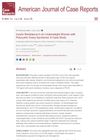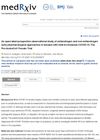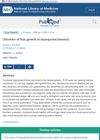September 2020 in “Fertility and sterility” Hyperandrogenism does not affect the quality of blastocysts in PCOS patients undergoing IVF.
 19 citations,
July 2013 in “The obstetrician & gynaecologist”
19 citations,
July 2013 in “The obstetrician & gynaecologist” The document concludes that careful evaluation is needed to diagnose PCOS correctly due to similar symptoms in other conditions, and accurate testosterone level measurement is crucial.
 September 2016 in “Gynecology Obstetrics and Reproductive Medicine”
September 2016 in “Gynecology Obstetrics and Reproductive Medicine” Effective treatment for skin issues in women with PCOS includes oral contraceptives, antiandrogens, and other medications and procedures.
89 citations,
March 2001 in “Endocrine practice” The guidelines help doctors diagnose and treat hormone-related disorders in women.
 97 citations,
July 2006 in “Dermatologic therapy”
97 citations,
July 2006 in “Dermatologic therapy” The document concludes that accurate diagnosis and personalized treatment are important for skin problems in women with PCOS.

Androstenedione is better than testosterone for diagnosing PCOS in Indian women.
 December 2024 in “American Journal of Case Reports”
December 2024 in “American Journal of Case Reports” Underweight women with PCOS can have insulin resistance, and treatment with metformin and dexamethasone can improve symptoms.
 14 citations,
September 2007 in “Steroids”
14 citations,
September 2007 in “Steroids” The study concluded that androstendione and DHEA are important for diagnosing high male hormone levels in women with excessive hair growth.
 39 citations,
September 2000 in “Obstetrics and Gynecology Clinics of North America”
39 citations,
September 2000 in “Obstetrics and Gynecology Clinics of North America” Insulin-lowering medications show promise for PCOS symptoms but can't be the main treatment yet due to limited long-term research.
 6 citations,
October 2020 in “medRxiv (Cold Spring Harbor Laboratory)”
6 citations,
October 2020 in “medRxiv (Cold Spring Harbor Laboratory)” Early treatment improved COVID-19 outcomes, and spironolactone helped reduce risks in females with high androgen levels.
 6 citations,
October 2016 in “Contraception”
6 citations,
October 2016 in “Contraception” The medication cyproterone acetate/ethinylestradiol is usually prescribed correctly for acne after other treatments don't work.
7 citations,
May 2014 in “Iranian Red Crescent medical journal” Laser hair removal is effective for hirsutism when combined with treatment for the underlying causes.
 4 citations,
July 2017 in “Medicine”
4 citations,
July 2017 in “Medicine” The document concludes that managing PCOS involves lifestyle changes, medication for symptoms, and weight loss for fertility improvement.
 3 citations,
January 1988 in “PubMed”
3 citations,
January 1988 in “PubMed” High prolactin levels can cause skin and hair symptoms similar to those caused by hormone imbalances.
July 1998 in “Annals of saudi medicine/Annals of Saudi medicine” A misdiagnosed case of HAIR-AN syndrome led to unnecessary surgeries and highlighted the importance of correct diagnosis and treatment.
 195 citations,
May 2003 in “Obstetrics and gynecology (New York. 1953. Online)/Obstetrics and gynecology”
195 citations,
May 2003 in “Obstetrics and gynecology (New York. 1953. Online)/Obstetrics and gynecology” Most women with excess hair growth have an underlying hormonal issue, often treated with medication and hair removal methods.
 3 citations,
April 2017 in “Clinical Drug Investigation”
3 citations,
April 2017 in “Clinical Drug Investigation” The study found that prescribing patterns for Cyproterone Acetate/Ethinylestradiol in Italy did not significantly change after EMA recommendations.
 1 citations,
July 2019 in “The journal of applied laboratory medicine”
1 citations,
July 2019 in “The journal of applied laboratory medicine” Venous catheterization may help diagnose the cause of female hyperandrogenism when imaging is unclear.
 19 citations,
August 2016 in “Health and Quality of Life Outcomes”
19 citations,
August 2016 in “Health and Quality of Life Outcomes” Metformin helped improve the quality of life for Chinese women with PCOS, especially in physical health and symptoms like infertility, acne, and hair loss.
 18 citations,
July 2019 in “Clinical Endocrinology”
18 citations,
July 2019 in “Clinical Endocrinology” Women with PCOS in Sicily show different levels of metabolic problems depending on their PCOS type, with obesity and abnormal lipid profiles being common.
 61 citations,
June 2016 in “Clinical Medicine”
61 citations,
June 2016 in “Clinical Medicine” PCOS is often linked to insulin resistance and obesity, and weight loss can improve symptoms.
 August 2023 in “Frontiers in Endocrinology”
August 2023 in “Frontiers in Endocrinology” Mutations in mitochondrial DNA might significantly contribute to the development of Polycystic Ovarian Syndrome.
 23 citations,
January 2016 in “Journal of Nanjing Medical University”
23 citations,
January 2016 in “Journal of Nanjing Medical University” Overweight women with PCOS are more likely to have excess male hormones.
 October 2022 in “Journal of Pediatric and Adolescent Gynecology”
October 2022 in “Journal of Pediatric and Adolescent Gynecology” A special blood test helped find the overactive ovary in a teen with PCOS, and removing that ovary improved her condition.
 1 citations,
December 2022 in “Gynecological Endocrinology”
1 citations,
December 2022 in “Gynecological Endocrinology” The most common skin issues in females with Polycystic Ovary Syndrome (PCOS) are excessive hair growth, hair loss, oily skin, acne, dark skin patches, and skin tags, which may be linked to hormone and insulin levels.
 November 2022 in “The Journal of Clinical Endocrinology and Metabolism”
November 2022 in “The Journal of Clinical Endocrinology and Metabolism” Postmenopausal hyperandrogenism, a condition with symptoms like increased hair growth and acne, is usually caused by PCOS but can also be due to other factors. It's diagnosed by checking testosterone levels and treated either by removing the adrenal tumor or through antiandrogen therapy.
 3 citations,
May 2016 in “Gynecological Endocrinology”
3 citations,
May 2016 in “Gynecological Endocrinology” Low-dose flutamide improved hirsutism and satisfaction in women but had common side effects, causing some to stop treatment.
 1 citations,
May 2021 in “International Journal Of Medical Science And Clinical Invention”
1 citations,
May 2021 in “International Journal Of Medical Science And Clinical Invention” Women with PCOS may have a higher risk of severe COVID-19 due to hormonal imbalances and vitamin D deficiency.
 1 citations,
September 2020 in “Endocrinology, Diabetes & Metabolism Case Reports”
1 citations,
September 2020 in “Endocrinology, Diabetes & Metabolism Case Reports” The conclusion is that thorough investigation of hypertension and hormonal dysfunctions is important, and there may be a link between these conditions and cancer.
 18 citations,
July 2010 in “Expert Review of Endocrinology & Metabolism”
18 citations,
July 2010 in “Expert Review of Endocrinology & Metabolism” The document concludes that PCOS has a strong genetic component, but more research is needed to fully understand the specific genes involved.

























